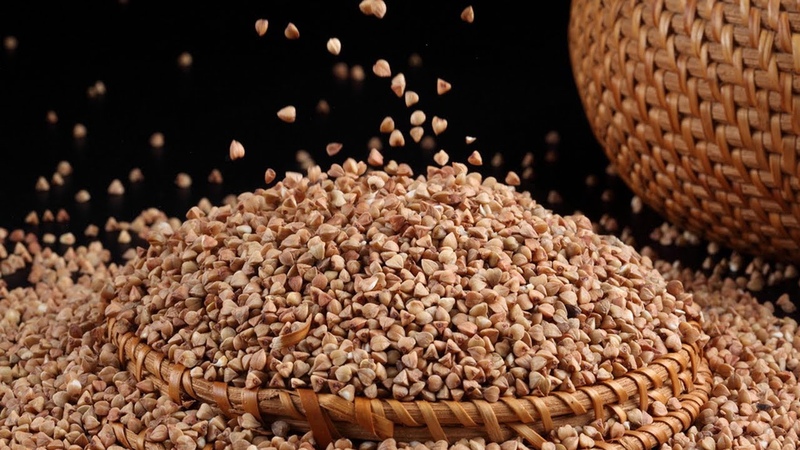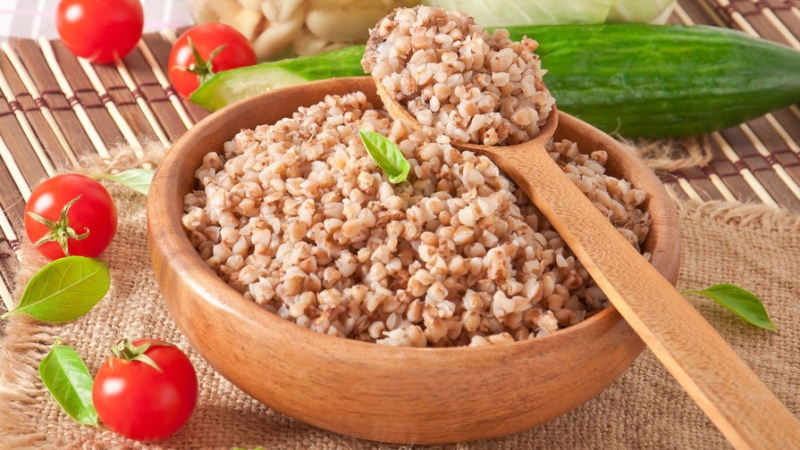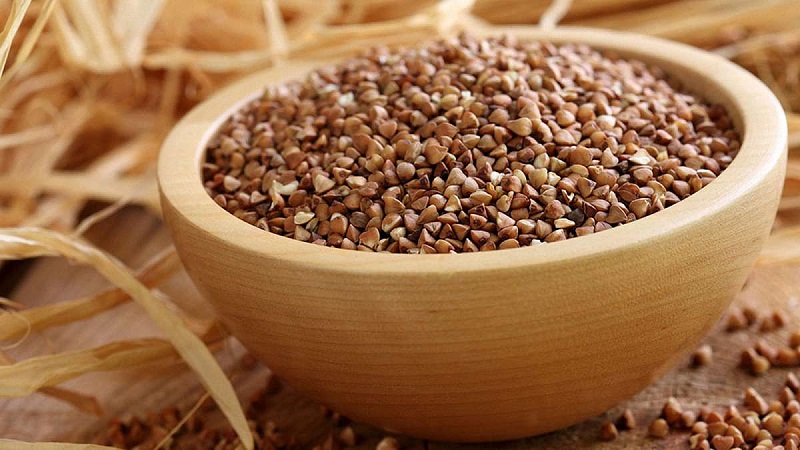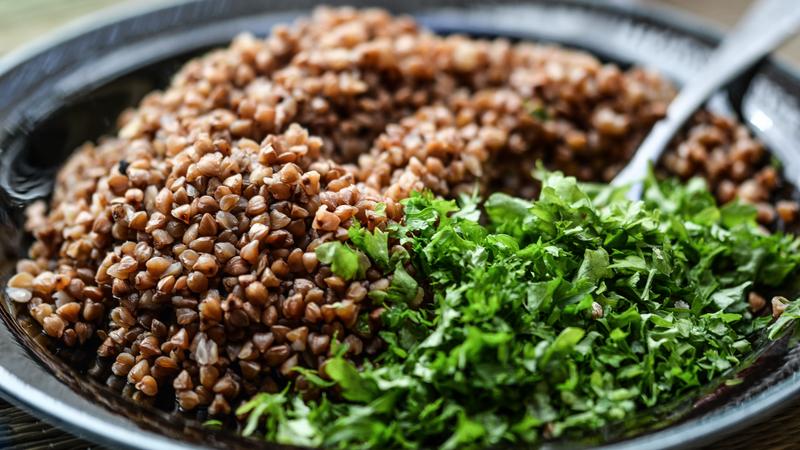What will happen if there is buckwheat every day and to whom such a diet is contraindicated
Buckwheat is one of the healthiest foods for the body. Its prices are low and you can find it in any store. Cooking porridge will not be difficult and will not take much time.
However, buckwheat can be harmful if you do not follow simple rules. You will learn from the article about when buckwheat is beneficial, and in what cases - harm.
The content of the article
What happens if you eat buckwheat every day
Buckwheat is one of the most nutritious and healthy grains... The product contains a lot of useful compounds and has a special taste. Buckwheat porridge gives a feeling of fullness for a long time, since it contains complex carbohydrates that are absorbed within a few hours. If you eat buckwheat alone, the body will receive many of the necessary trace elements and substances, but such a mono-diet cannot be abused.

Is it possible to eat it every day
Eating one cereal daily for a long time is unsafe... It is recommended to spend from one to three fasting days in a row.
Consuming buckwheat on a daily basis can lead to health problems, since one product cannot provide the body with all the necessary substances. It is worth adding fruits, vegetables, poultry, fish to the menu so that the diet is balanced and does not harm health.
What will happen if you eat only buckwheat
If you consume one buckwheat for a month, it will appear:
- apathy;
- prostration;
- dizziness;
- weakness.
The longest buckwheat mono diet lasts up to 10 days, then take a break.
Regular but moderate consumption of buckwheat cleanses the body of toxins and promotes rapid weight loss. The fiber contained in the grain reduces putrefactive processes in the intestines and improves peristalsis.
How often can you eat cereals
Optimally arrange fasting days on buckwheat: Use only buckwheat for 2-3 days or buckwheat with kefir... Further - the usual diet and after a week or two - again a fasting diet.
If you want to lose weight quickly, you can sit on a buckwheat diet for 1-2 weeks, using additionally allowed foods (kefir, a hen, vegetables, unsweetened fruits). Such a diet will not cause any serious negative consequences in a healthy person.
The composition and properties of buckwheat
Regular consumption of buckwheat minimizes the risk the occurrence of vitamin deficiency.

The nutritional value
100 g of buckwheat contains:
- carbohydrates - 67.1 g;
- proteins - 14.9 g;
- water - 13 g;
- fats - 3.9 g;
- dietary fiber - 13.3 g;
- fiber - 0.3 g;
- monosaccharides and disaccharides - 0.9 g;
- vitamin E - 0.1 mg;
- vitamin K - 1.9 mcg;
- vitamin B1 - 0.0 mg;
- vitamin B3 - 0.9 mg;
- vitamin B4 - 20.1 mg;
- vitamin B5 - 0.4 mg;
- vitamin B6 - 0.1 mg;
- vitamin B9 - 14.0 mcg;
- calcium - 7.0 mg;
- iron - 0.8 mg;
- magnesium - 51.0 mg;
- phosphorus - 70.0 mg;
- potassium - 88.0 mg;
- sodium - 4.0 mg;
- zinc - 0.6 mg;
- copper - 0.1 mg;
- manganese - 0.4 mg;
- selenium - 2.2 mcg.
Benefit and harm
The benefits of buckwheat:
- strengthens the walls of blood vessels and heart, bones and spine;
- calms nerves, improves sleep;
- normalizes blood pressure;
- lowers blood sugar;
- easily digested and absorbed by the digestive system;
- removes fluid from the body, thereby improving the work of internal organs;
- gives elasticity and rejuvenates the walls of blood vessels;
- reduces the risk of developing varicose veins;
- increases hemoglobin and immunity;
- improves mental performance;
- has a diuretic effect - removes toxins and toxins, reduces the load on the liver;
- improves metabolism and fights excess weight;
- reduces the risk of gallstones;
- normalizes the functions of the gastrointestinal tract, relieving from constipation and flatulence;
- increases efficiency.
Continuous eating buckwheat for a month or more is harmful to the body:
- the kidneys begin to function worse, since a large amount of vegetable protein enters the body;
- hormonal disruptions;
- problems with the digestive system;
- nervous disorders.

The effect of buckwheat on the body of women, men, children
The benefits of buckwheat are the same for any organism. But women most often use it to lose weight, men to build muscle, and children need croup to replenish energy.
Benefits for women
Buckwheat flooded with water or sugar-free yogurt for the night, will become a full breakfast for women, rich in trace elements and vitamins. You can add prunes or an apple to such porridge, which will give additional benefits and taste.
Women who regularly consume buckwheat, look younger, have a healthy skin color, and a slim figure - extra pounds and fluid go away. Thanks to copper and calcium, nails and hair are strengthened and grow faster.
Note. The presence of buckwheat in the diet of a pregnant woman reduces the risk of toxicosis.
Benefits for men
For men engaged in physical labor or sports, buckwheat porridge is included in the list of must-have foods... It gives strength, strengthens the skeleton, promotes muscle building and protects the heart from overload. It's not just that this porridge is called a soldier's, or heroic.
Magnesium, zinc, trace elements increase the level of the male hormone testosterone. Buckwheat is able to prevent inflammation of the prostate gland. Men who often use buckwheat are less prone to depression and negative emotions, because cereal has a beneficial effect on the state of the nervous system. The dietary properties of cereals do not allow the formation of a "beer" belly.
Benefits for children
Buckwheat is included in complementary foods the first of the cereals. It is hypoallergenic and easily absorbed by the child's body... With age, the child becomes more active, and buckwheat replenishes the spent energy, promotes growth, full-fledged work of organs, and strengthening of immunity.
It is necessary to add buckwheat porridge to the child's diet, but it is impossible to overfeed children with buckwheat. It is useful to give porridge in 2-3 days and preferably in the morning, so that the child recharges energy. It is not recommended to feed with buckwheat before going to bed, since during sleep the stomach can swell and heaviness in the stomach can appear. For small children, porridge is made from specially processed cereals.
In what form is it better to use buckwheat
Buckwheat is boiled in milk, water or steamed overnight, casseroles are made from it, even fried - although this reduces the beneficial properties.
It is more useful to use buckwheat cooked in water, but it is tastier - left overnight in yogurt or kefir.

What to combine with
Buckwheat can be enhanced with seasonings such as dill or parsley... Adding sautéed onions, tomatoes, carrots will bring additional benefits. Honey, nuts, butter and all kinds of meat are combined with cereals, but such foods are high in calories and are not suitable for a diet. And prunes and apples will diversify the taste of cereals and will not affect a strict diet.
Buckwheat porridge is most often consumed with milk or cooked in water... You can make porridge with kefir or sugar-free yogurt.
Diet porridge should not contain fatty additives, sugar and oil... It is allowed to add a little vegetable oil, preferably olive oil, fresh berries, fruits, further activating digestion and weight loss. It is better to drink porridge with low-fat milk, green tea.
Note. Different enzymes are needed to digest buckwheat with milk. Iron, which is abundant in buckwheat, blocks the absorption of calcium, which is found in large quantities in milk.
Is it possible to lose weight if there is buckwheat every day
Most often it is steamed buckwheat that is used in diets.... Such buckwheat retains a greater amount of nutrients, more effectively cleans the body of toxins, accelerates metabolic processes, prevents constipation, which contributes to weight loss.
Steamed washed dried cereals with boiling water, low-fat milk or yogurt without sugar until morning, tightly closed with a lid, wrapped on top with a terry towel or cooked in a thermos. By the morning, the porridge swells, and you can eat it for breakfast.
How long can you sit on such a diet? It is not recommended to keep a diet on buckwheat for more than a week... With such a diet, it is important to monitor your well-being and drink 1.5-2 liters of water per day.
Important! Mono diets and fasting are very stressful for the body. Having lost 10 kg on such diets, it is easy to gain 20 kg later. It is better to normalize food and include buckwheat in the diet as one of the foods in reasonable quantities.
Contraindications
The use of buckwheat is often and in large quantities has contraindications. Who is not allowed to get involved in cereals?
First of all to people:
- having chronic diseases of the gastrointestinal tract, since an excess causes spasms, diarrhea, and sometimes constipation;
- a tendency to hypotension, since the magnesium contained in this product relaxes the walls of blood vessels, which leads to a decrease in pressure;
- increased gas formation;
- cardiovascular diseases;
- renal failure;
- intolerance to buckwheat.
Conclusion
Groats bring benefits to the body and are indispensable for losing weight. Microelements and vitamins contained in cereals support the stable functioning of systems and organs. Buckwheat porridge for breakfast is a great start to the day. Buckwheat will energize, fill the body with nutrients and help you lose weight.